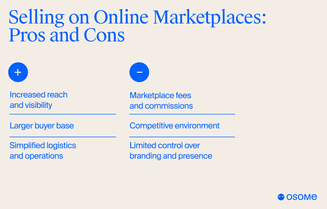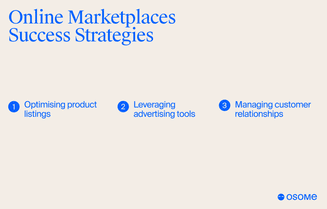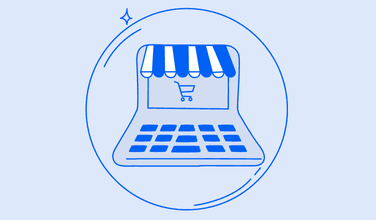- Osome Blog HK
- Best Online Marketplaces
The Best Online Marketplace Platforms for Sellers in Hong Kong and Worldwide
- Modified: 19 December 2025
- 9 min read
- Ecommerce


Heather Cameron
Author
Heather is here to inform and inspire our readers. Boasting eight years in the world of digital marketing, working in diverse industries like finance and travel, she has experience writing for various audiences. As Osome’s resident copywriter, Heather crafts compelling content, including expert guides, helpful accounting tips, and insights into the latest fintech trends that will help entrepreneurs, founders and small business owners in Hong Kong take their businesses to the next level.
An online marketplace lets retailers worldwide sell products through a single platform that attracts millions of buyers around the world. This comprehensive guide lists the top marketplaces in 2026 and explains how they work, their benefits, and challenges.
Key Takeaways
- An Online marketplace comes in B2B, B2C, and C2C models. It connects sellers with buyers around the world, allowing businesses to reach customers internationally and enhance sales opportunities.
- Selling on established marketplaces like Facebook Marketplace, Amazon and eBay increases visibility and helps you compete for the vast global market share to sell internationally.
- Common challenges behind selling products online include platform fees, competition, and limited branding control. Therefore, it is crucial to choose the right platform based on your product categories and market needs.
Understanding Online Marketplaces
Online marketplaces are ecommerce sites that aggregate products from various sellers, providing a one-stop shop for consumers. These platforms often serve as the first destination for shoppers, offering the convenience of comparing prices and products from multiple sellers in one place. Each marketplace has unique features, such as specific listing fees, product categories, and buyer demographics, which shape the selling experience.
Online marketplaces are typically categorised by business models: B2B (business-to-business), B2C (business-to-consumer), and C2C (consumer-to-consumer). For example, Alibaba Group operates Taobao Mall (C2C), Tmall (B2C), and Alibaba.com (B2B), each targeting different market segments. Similarly, Amazon integrates third-party sellers in its vast B2C ecosystem, while eBay primarily functions as a C2C marketplace. Understanding these distinctions helps sellers choose the most suitable platform for their products and target audience.

To further support your success, Osome offers online business registration services to get you started and ecommerce accounting services to ensure that your financial operations are streamlined, helping you manage sales, expenses, and profits across multiple platforms with ease.
Benefits of Selling on Online Marketplaces
Selling on these online platforms offers numerous benefits, beginning with drastically increasing market reach, which leads to increased sales revenues. Plus, they introduce your brand to new sales channels, making your company more resilient. Most platforms also provide better customer experiences, resulting in higher chances of repeat business, which is crucial for long-term success.
Increased reach and visibility
Online marketplaces provide access to approximately 3 billion active monthly visitors across major platforms like Amazon, eBay, and Walmart. This vast audience offers sellers the opportunity to reach millions of potential customers in the global marketplace, significantly boosting visibility and sales.
Platforms like Facebook Marketplace, with over 2.7 billion users monthly, showcase the potential consumer engagement you can tap into. By listing products on these popular marketplaces, you can appeal to diverse customer preferences, from clothing to tech gadgets, ensuring they reach the right audience.
Larger buyer base
One of the biggest advantages is access to a large buyer base, with platforms like Amazon offering unparalleled reach. Selling internationally is also highly profitable, as over 80% of businesses in cross-border ecommerce find it lucrative. The profit potential is immense, with 83% of potential sales found globally.
Simplified logistics and operations
Once a purchase is made, online platforms manage the entire transaction process, ensuring a streamlined experience for both buyers and sellers. This includes user-friendly inventory management and customer service features, enhancing operational efficiency in the online store.
Transparency in stock levels, prices, and availability can help maintain clear communication with customers and build trust. Selecting a marketplace with robust features and integrations can further simplify logistics and operations, facilitating easier management of sales across multiple channels and countries.

Common Challenges
Selling online also comes with its own set of challenges. Listing fees and commissions can significantly impact profitability, so understanding these costs is vital for optimisation. Additionally, the competitive environment on these platforms requires unique strategies to stand out and succeed.
Limited control over branding and presence
One of the major challenges is the limited control over branding and presence, as businesses must adhere to the platform's rules and restrictions. This can make it difficult to establish a distinct brand identity, which is crucial for long-term success.
Marketplace fees and commissions
Each ecommerce platform comes with unique fees. For instance, Amazon charges $ 39.99 monthly for its Professional Seller plan with additional fees depending on product category and fulfilment strategy. eBay charges a non-refundable listing fee, an insertion fee for multiple categories, and a final value fee ranging from 10% to 12%.
On the other hand, Etsy charges $ 0.20 for each item and requires listing renewal every four months. Understanding fee structures and how they affect profitability is crucial for optimising your online sales strategy.
Competition and saturation
High levels of competition on popular marketplaces can make it difficult for newer ecommerce businesses to stand out among numerous similar offerings. Analysing competitors can help identify unique opportunities and differentiate them from others in the marketplace.
Top 10 Online Marketplaces in the World for 2026
When choosing where to sell, it's essential to consider the top marketplaces and their unique advantages. In 2026, these leading platforms offer vast market reach and robust seller support, making them ideal for sellers aiming to grow sales internationally.
1 Amazon
Amazon, launched in 1994 originally as an online bookstore, has become a largest online marketplace in the global ecommerce market. Known for selling over 4,000 products every minute, it offers individual and professional seller plans. The platform retains customers with detailed product categories, exclusive discounts, and smart product comparisons. With 44% of online shoppers checking prices on Amazon first, businesses can leverage advertising and listing optimisation to attract more visitors.
2 eBay
eBay operates in 190 global markets with over 135 million users. It supports both auction-style and other listing formats, making it versatile for various product categories. eBay fees vary by category but offer flexible selling options. It generates an annual gross market value of $83 billion, serving both consumer-to-consumer and business sellers. While eBay is one of the largest online marketplaces worldwide, it remains especially popular for its consumer to consumer auction format.
3 Etsy
Etsy focuses on handmade or vintage items and craft supplies, ideal for crafters, artists, and collectors. Present in 27 markets, it helps small businesses reach a global audience. Etsy sellers often drive traffic from social media and use the platform as a cost-effective alternative to traditional ecommerce websites.
Etsy's active buyer base nearly doubled from 46 million in 2019 to approximately 95 million in 2025, reflecting strong community growth. eBay reported over 2.4 billion listings in 2025, with fixed-price listings comprising 88% of total offerings.
4 Walmart Marketplace
Walmart Marketplace is an invite-only platform catering to over 200 million customers weekly. It requires sellers to have a history of positive feedback and offers substantial reach with competitive referral fees typically ranging from 6% to 20% depending on product category.
5 Alibaba Group Marketplaces
Alibaba Group includes Taobao, TMall, and AliExpress. TMall targets high-quality branded products, capturing 58% of the online shopping user share. Taobao, with 895 million monthly users, is the largest marketplace by gross merchandise value. AliExpress serves as Alibaba's cross-border marketplace with commission fees between 5% and 8%.
6 Facebook Marketplace
Facebook Marketplace connects sellers and buyers locally with integration into social profiles, enabling social commerce. Local sales are free of listing fees, but a 10% selling fee applies when using Facebook's shipping options, making it suitable for local sellers and product testing.
Facebook Marketplace sees over 2.7 billion monthly active users globally, with local sales growing by 15% year-over-year. Walmart Marketplace grew its seller base by 25% in 2025, driven by increased demand for online grocery and household products.
7 Bonanza
Bonanza is a growing alternative to eBay, offering diverse product categories including clothing, home decor, and collectables. It charges no listing fees, with a final value fee starting at 11% plus a small transaction fee for non-members. It integrates with Amazon and eBay for multi-channel selling.
8 Poshmark
Poshmark is a social commerce marketplace focused on fashion and lifestyle items, popular with younger demographics. It charges a flat commission of £ 2.95 on sales under £ 15 and 20% on sales over £ 15. Sellers manage shipping themselves as there is no automated fulfilment integration.
9 Ruby Lane
Ruby Lane specialises in vintage goods and antiques, targeting sellers and buyers of collectibles, art, dolls, and jewellery. It charges a monthly maintenance fee of £ 45 and a 9.9% service fee on orders up to £ 2,500, offering access to a highly targeted audience.
Poshmark recorded over 80 million registered users in 2025, maintaining its status as a leading social commerce platform for fashion. Bonanza's marketplace sessions exceeded 1.1 million monthly visits in mid-2025, generating nearly $ 3.4 million in sales.
10 Swappa
Swappa is a marketplace for tech products like smartphones, laptops, and cameras. It ensures products are in good working condition and protects payments via PayPal. There are no listing fees, but a 3% fee is charged on sales, making it ideal for electronics sellers.
Niche Marketplaces and Local Selling Platforms
In addition to the global giants, niche marketplaces and local selling platforms cater to specific product categories or community-based sales, offering unique opportunities for sellers.
1 Mercado Libre
Mercado Libre is a leading marketplace in Latin America, serving over 18 countries with integrated payments and financial services. In Q2 2025, it had 71 million unique buyers and facilitated over 550 million transactions, marking significant growth in the region.
2 Newegg
Specialising in electronics and tech accessories, Newegg attracts a tech-savvy audience. It has referral fees ranging from 8% to 15% and a stringent seller approval process.
3 Chairish
Chairish is an online consignment marketplace for high-quality home décor and furniture. It offers curated listings and handles shipping logistics, returning between 60% and 80% of the selling price depending on the seller plan.
Newegg maintained strong growth in electronics sales, with referral fees adjusted to reflect competitive market conditions. As of August 2025, Chairish, along with its European sister site Pamono, connected over 12,000 sellers with buyers, focusing on high-end home decor and furniture consignments.
4 TikTok Shop
TikTok Shop leverages viral social commerce with shoppable videos and livestreams. It charges referral fees around 6% in the US and suits trend-driven products and businesses leveraging viral marketing.
5 Zalando
A leading European fashion marketplace serving over 50 million customers, offering a mobile-first shopping experience and supporting sellers across multiple European countries.
6 Fruugo
A cross-border marketplace with wide international reach, providing localised shopping experiences and supporting multiple currencies and digital wallets for international sales.
TikTok Shop saw one in three US users making purchases directly through the platform in 2025, highlighting its growing influence in social commerce. Zalando's active customer base grew from 13.5 million in 2014 to over 61.4 million in Q3 2025, solidifying its position in European fashion ecommerce.
7 FullBeauty
Focused on plus-size fashion in the US, FullBeauty generates nearly £ 1 billion in annual revenue with 5 million active customers, serving a growing niche market.
8 VarageSale
A virtual garage sale app emphasising safety and community trust by verifying user identities. Ideal for sales on local markets of furniture, clothing, and more.
9 OfferUp
OfferUp allows local browsing and selling by postcode with safety features like user reviews and verified identities. It recommends community meetup spots for secure transactions.
10 Tanga
Tanga is known for offering deep discounts and attracting a loyal deal-seeking audience. It is a niche marketplace that provides sellers with access to value-conscious buyers and has driven significant revenue growth in recent years.
Best Online Marketplaces in Hong Kong
For sellers targeting the Hong Kong market, leveraging local and regional online marketplaces can be a strategic way to reach customers effectively. These platforms cater to the unique preferences and shopping habits of consumers in Hong Kong, offering opportunities for both local sales and cross-border selling.
1 Carousell
Carousell is one of the most popular online marketplaces in Hong Kong, known for its user-friendly mobile app and focus on C2C sales. It allows users to buy and sell a wide range of products, from electronics to fashion, with a strong community presence in the region.
2 HKTVmall
HKTVmall is a leading Hong Kong-based online shopping platform offering a vast selection of products, including groceries, electronics, and fashion. It combines marketplace sellers with its own inventory, providing fast delivery and trusted service to local consumers.
3 Taobao (Hong Kong)
Taobao, operated by Alibaba Group, is widely used by Hong Kong shoppers for its extensive product range and competitive prices. Many sellers use Taobao to reach Hong Kong consumers through cross-border selling, benefiting from integrated payments and logistics services.
HKTVmall continues to expand its product range and logistics capabilities, serving a growing local customer base. Taobao remains a top choice for Hong Kong shoppers, with convenient payment options and cross-border logistics improving seller reach.
4 Amazon Hong Kong
Amazon has expanded its presence in Hong Kong, offering local consumers access to its vast global product selection. Sellers can use Amazon’s platform to reach Hong Kong buyers directly, leveraging Amazon’s fulfilment and customer service infrastructure.
5 Pinkoi
Pinkoi is a niche marketplace popular in Hong Kong for unique, designer, and handmade products. It supports independent creators and small businesses, attracting consumers looking for distinctive and creative items.
6 Facebook Marketplace Hong Kong
Facebook Marketplace is widely used in Hong Kong for local buying and selling, providing a convenient platform integrated with users’ social networks. It’s especially popular for secondhand goods and community-driven sales.
7 Zalora Hong Kong
Zalora is a leading fashion ecommerce platform in Hong Kong, offering a curated selection of clothing, footwear, and accessories. It provides sellers access to a fashion-focused audience with strong local brand recognition.
8 Shopee Hong Kong
Shopee, a mobile-first marketplace popular across Southeast Asia, has been expanding its presence in Hong Kong. It offers sellers access to a growing base of mobile shoppers with localised promotions and logistics support.
9 eBay Hong Kong
eBay remains a relevant platform for sellers targeting Hong Kong, especially for collectibles, electronics, and international products. Its auction-style and fixed-price listings provide flexible selling options.
10 Etsy Hong Kong
Etsy’s global reach extends to Hong Kong, where it serves buyers interested in handmade, vintage, and craft items. Local sellers can tap into this niche market to connect with customers seeking unique products.
Leveraging these marketplaces in Hong Kong allows sellers to connect with local consumers, benefit from established logistics, and integrate with popular payment methods, making it easier to start selling and grow their business in this dynamic market.
Strategies for Success
Running a successful online store involves following essential strategies, such as optimising product listings, leveraging advertising tools, and managing customer relationships effectively.
- Optimising product listings. Optimise product listings with high-quality images and detailed, engaging descriptions. Amazon, Etsy, and other platforms also provide tools and guidelines for companies to market their businesses more effectively and attract more buyers.
- Leveraging advertising tools. Marketplace advertising can substantially increase product visibility and traffic to listings. Native advertising tools on each platform can significantly enhance seller visibility and drive sales.
- Managing customer relationships. Good customer service is essential. Ensuring affordable products and maintaining high-quality customer service helps companies build a positive reputation among buyers.

How Osome Supports Your Ecommerce Business
Running a successful ecommerce business requires efficient management of finances, compliance, and operations. Osome offers comprehensive ecommerce accounting services designed to simplify these tasks, allowing you to focus on growing your online store. With Osome, you get access to AI-powered bookkeeping automation, expert accountants, and seamless integration with your ecommerce platforms, ensuring accurate financial records and timely tax filings.
Our services cover everything from accounting and bookkeeping to corporate secretarial compliance and payroll management, tailored specifically for ecommerce sellers in Hong Kong and beyond. By partnering with Osome, you benefit from streamlined marketplace operations, improved financial visibility, and expert guidance to help scale your business confidently.
Learn more about how Osome can help you manage your online sales efficiently with comprehensive ecommerce accounting services.
Summary
Selling as online stores grants access to larger buyer bases, simplifies logistics, and adds resilience to your business model, regardless of challenges such as commission fees and competition level. By choosing the right platforms, optimising product listings, leveraging advertising tools, and managing customer relationships effectively, sellers can achieve rapid digital growth. Integrating your own website with popular online marketplaces can further enhance your growth strategy by attracting new customers and increasing marketplace orders.
This multi-channel approach helps sellers build strong seller ratings and compete effectively on both global platforms and niche platforms. Whether you focus on social commerce, local markets, or selling internationally across the Asia Pacific region or Latin America, selecting the best marketplaces and understanding marketplace fees are all the difference between moderate and exceptional success in online selling.






